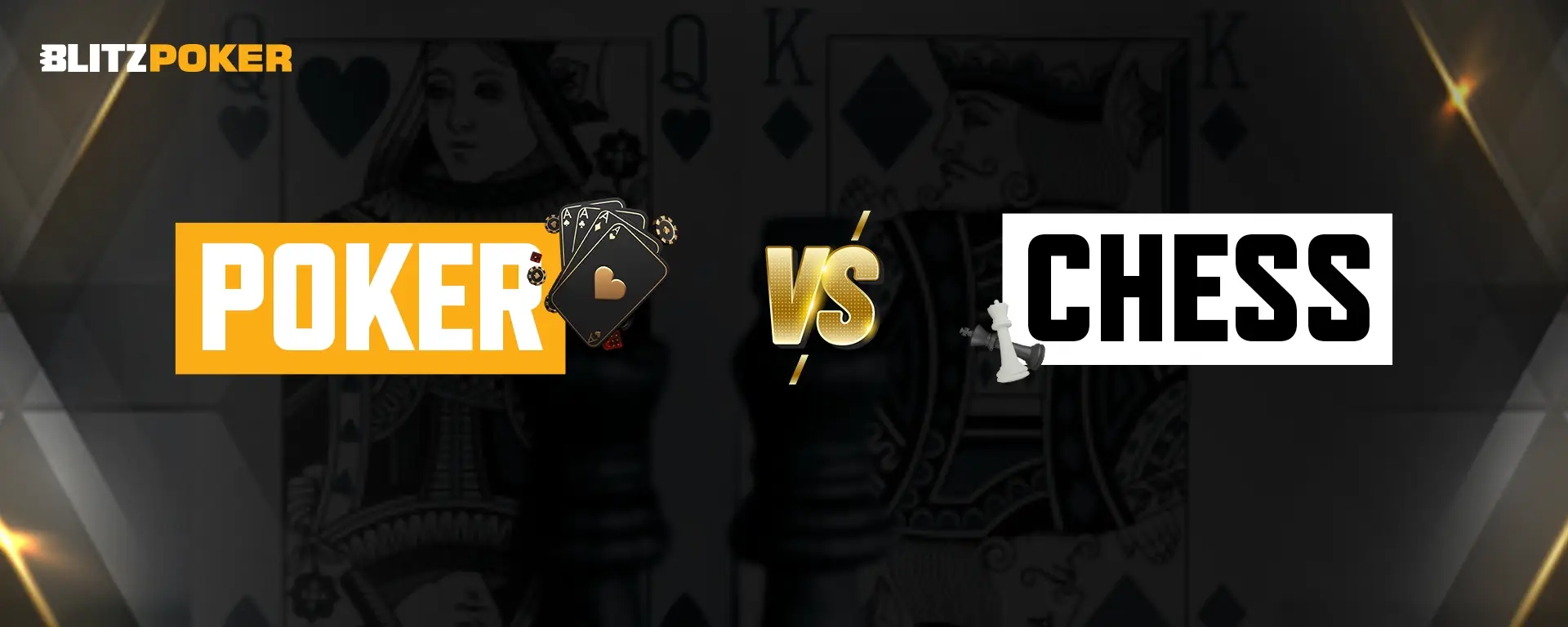Poker Vs Chess
Chess and poker have fascinated players for centuries. These popular strategy games are both exciting and intense, requiring sharp skills. Beginners often wonder which game to pick. They also question which one is more difficult. Dan Harrington, Ylon Schwartz, Almira Skripchenko, Eloi Relange and Dan Smith are some of the players who are good at both chess and poker.
The History and Rules Of Poker and Chess — Poker Vs Chess Rules and History
Poker
Poker is a well-known card game that started in the United States in the early 1800s. It remains popular among both casual and professional players. The game mixes strategy and luck, with a player’s skill greatly influencing their success. In poker, the aim is to make the best five-card hand from the cards dealt to you.
In the early days, players used a five-card draw format and usually faced only two to four opponents. Over time, poker’s rules changed, and many new versions emerged. Nowadays, poker can involve between two and ten players and is played in various formats, with Texas Hold ‘em being the most popular.
To become a great poker player, understanding poker strategy is crucial. This means knowing different types of hands, when to raise or fold, and how to play your position well. Mastering the art of bluffing is also key. With practice, you can boost your chances of winning each hand.
Chess
Chess is one of the oldest and most widely played games worldwide. It began in India during the 6th century and has since been enjoyed by people of all ages and cultures. Two players play the game on a board, each controlling 16 pieces. The objective is to move your pieces to capture your opponent’s king strategically.
The rules of chess are quite simple. Players alternate turns, moving only one piece at a time. Each piece moves differently: the rook moves in straight lines, either vertically or horizontally, while the knight moves in an L-shape. Pawns move a square forward but have the capability of capturing diagonally. To win, you must checkmate your opponent’s king, trapping it with your pieces.
Starting to play chess might seem challenging, but grasping the basic rules is essential for mastering the game. With practice and thoughtful strategy, anyone can become a proficient chess player.
The Mental and Physical Demands of Playing Chess and Poker
Chess and poker are two of the most challenging & strategic games you can play. They need a mix of analytical skills and psychological awareness. Although physical effort is minimal, especially during long games, the mental strain can be huge.
In chess, success depends on understanding the game’s complex strategies and tactics. Players need to think about each move carefully and predict their opponent’s moves several turns ahead. Knowing how to play chess is crucial because mistakes can be very costly. The game demands sharp focus and quick pattern recognition.
Poker, however, requires different skills. Instead of memorising rules, poker players must learn to read their opponent’s moves and betting habits. Luck plays a part, but skilled players must weigh the risks and rewards of every hand. Competing in poker tournaments needs strong emotional control, as the pressure can be intense.
Poker and IQ: Does IQ have an Impact on Poker Wins?
The quick response is unknown. No one is testing poker players twice to measure their IQ and personality traits objectively, comparing them to their success in poker.
No one brags about a low IQ, so let’s look at three cases of high-IQ players.
Fedor Holz had an IQ of 155 as a child, while most people range between 85 and 115. Despite this, he didn’t succeed in his first year of micro-stakes poker. He only gained fame after a lot of training.
Liv Boeree, a top poker player, has an IQ of 159. In 2019, she left poker to study artificial intelligence. By mid-2023, Liv suggested that AI should focus on wisdom, not just intelligence, as IQ doesn’t measure common sense or understanding of the world.
Daniel Negreanu has an even higher IQ of 162, surpassing Albert Einstein. Despite this, he ended two consecutive WSOPs with significant losses, showing that variance in poker is not tied to IQ.
Poker Vs Chess
People say poker is harder to master than chess. This is because winning poker needs more skills and intelligence.
Poker players depend on their intuition and understanding of situations more than chess players. They need to be good at reading people’s minds. Chess players mainly rely on their board skills, while poker players act based on their opponents’ reactions.
Chess players use their knowledge of the game’s rules to compete. Poker players combine skills with emotional intelligence. In poker, one must be quick to handle different situations during a game.
